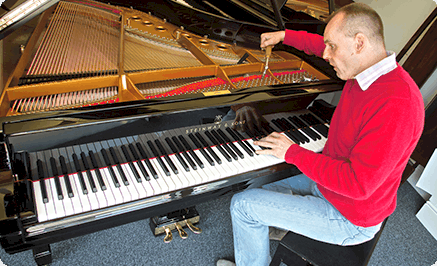Get interesting information about How Much Is It To Get A Piano Tuned, this article is specially curated for you from various reliable sources.

How Much Does It Cost to Get a Piano Tuned?
As a seasoned pianist, I’ve come to cherish the harmonious melodies that emanate from my beloved companion. However, maintaining a piano’s pristine condition requires regular tuning, necessitating the expertise of a skilled technician. Throughout my musical odyssey, I’ve gained valuable insights into the intricate process of piano tuning and its associated costs.
The average cost of piano tuning typically ranges from $60 to $200, with variations based on the tuner’s experience, the piano’s condition, and the region where the service is performed. It’s essential to invest in regular tuning to ensure optimal performance and preserve the instrument’s longevity.
Factors Influencing Tuning Costs
1. Tuner’s Experience and Certification
The level of expertise and certification held by the tuner directly impacts the cost of their services. Seasoned tuners with advanced certifications, such as Registered Piano Technician (RPT) or Certified Piano Technician (CPT), typically command higher rates due to their exceptional skills and extensive knowledge.
2. Piano’s Condition
The condition of the piano also plays a significant role in determining the cost of tuning. A piano that has been neglected or heavily used may require more extensive adjustments and repairs, leading to a higher tuning fee. Factors such as loose or broken strings, worn-out hammers, and misaligned keys can increase the complexity and duration of the tuning process.
3. Geographical Location
Regional variations in the cost of living can also influence piano tuning prices. Urban areas with higher living expenses often have higher rates for piano tuning services compared to more rural locations. It’s advisable to contact local tuners in your area to inquire about their pricing.
Piano Tuning Process
The piano tuning process involves meticulously adjusting the tension of each string to achieve the desired pitch. The tuner uses specialized tools, such as a tuning fork and a tuning hammer, to make微小的 adjustments to the string length or tension.
A standard piano has 88 keys, each corresponding to a specific pitch. The tuner starts by tuning the ‘A’ key to a reference pitch, typically 440 Hz. They then proceed to tune the other keys in relation to ‘A,’ ensuring that the intervals between the notes are accurate and harmonious.
Latest Trends and Developments
Advancements in technology have brought about innovative approaches to piano tuning. Electronic tuning devices, such as strobe tuners and frequency analyzers, assist tuners in achieving precise and efficient tuning. These devices provide visual or digital feedback, allowing tuners to make adjustments with greater accuracy.
Additionally, the emergence of online piano tuning services has made it more convenient and accessible for individuals to maintain their instruments. These services often offer remote tuning sessions, where tuners use video conferencing to guide the user through the tuning process.
Tips and Expert Advice
To ensure a successful piano tuning experience, consider the following tips and expert advice:
- Choose a reputable tuner: Seek recommendations from friends, music teachers, or piano stores to find a skilled and experienced tuner.
- Schedule regular tunings: Aim to have your piano tuned at least twice a year, or more frequently if it’s used heavily or exposed to extreme temperature fluctuations.
- Prepare your piano: Before the tuner arrives, clean the exterior of your piano and ensure that the keys are functioning properly.
- Communicate your needs: Discuss your expectations with the tuner, including any specific preferences or concerns you may have.
By following these tips, you can ensure that your piano receives the best possible care and continues to produce beautiful music for years to come.
FAQ
- Q: How often should I tune my piano?
- A: It’s recommended to tune your piano at least twice a year, or more frequently if it’s used heavily or exposed to extreme temperature fluctuations.
- Q: What are the signs that my piano needs tuning?
- A: Signs that your piano needs tuning include difficulty playing in tune, notes sounding out of harmony, and inconsistent action across the keyboard.
- Q: Can I tune my piano myself?
- A: While it’s possible to attempt self-tuning, it’s generally not recommended unless you have extensive experience and the proper tools. Professional piano tuners have the skills and expertise to achieve precise and consistent tuning.
Conclusion
The cost of piano tuning can vary depending on several factors, including the tuner’s experience, the piano’s condition, and the geographical location. By choosing a reputable tuner, scheduling regular tunings, and following expert advice, you can ensure that your piano remains in optimal condition, enriching your musical journey.
Are you interested in learning more about piano tuning and its importance in maintaining a healthy instrument? Share your thoughts and questions in the comments section below.

Image: mymusicexpress.com
We express our gratitude for your visit to our site and for taking the time to read How Much Is It To Get A Piano Tuned. We hope you benefit from How Much Is It To Get A Piano Tuned.